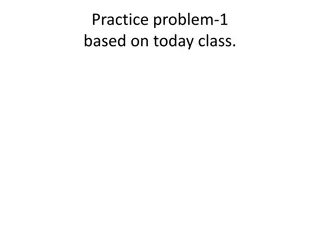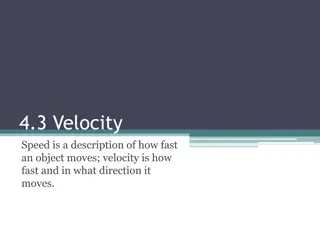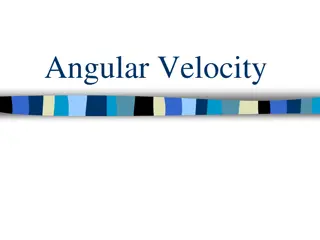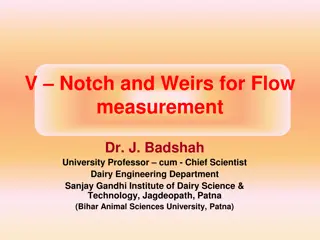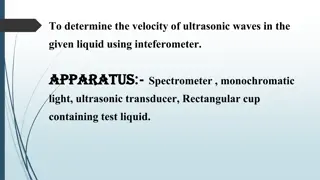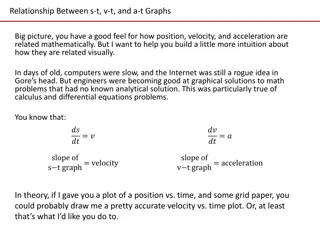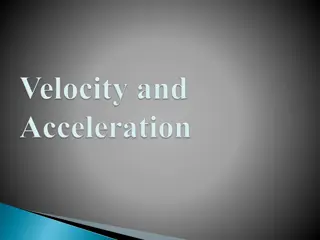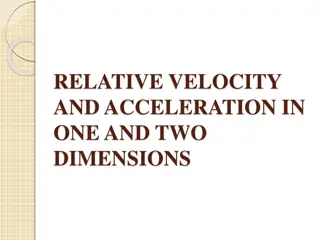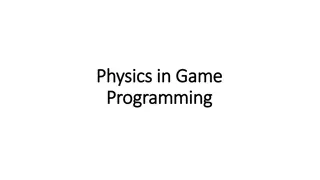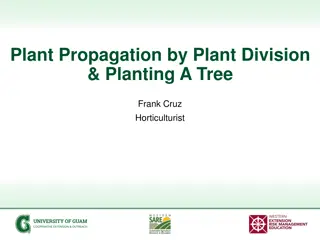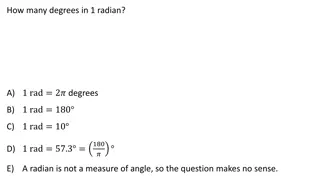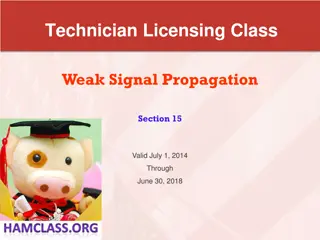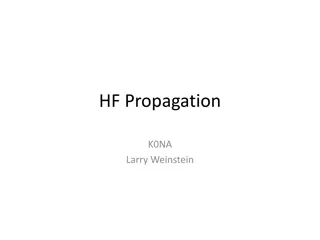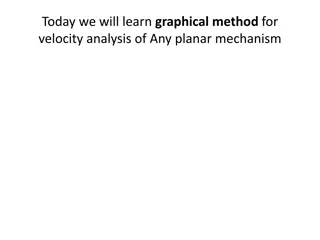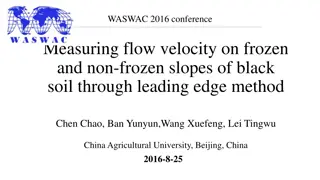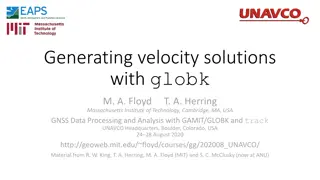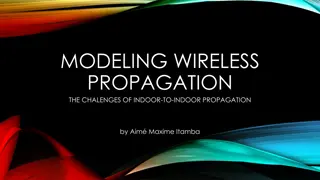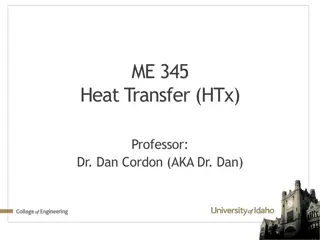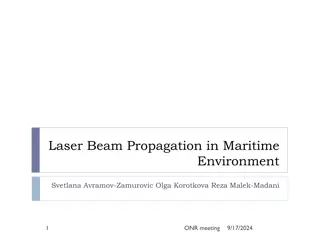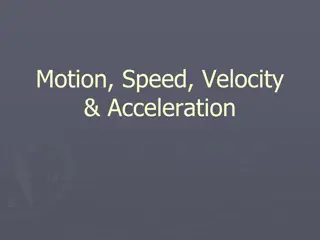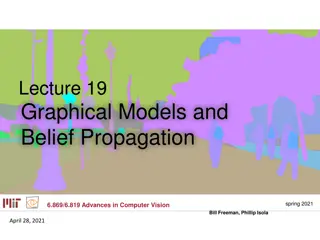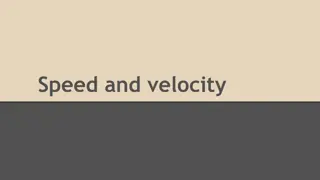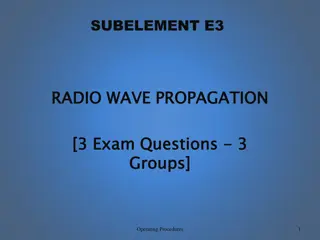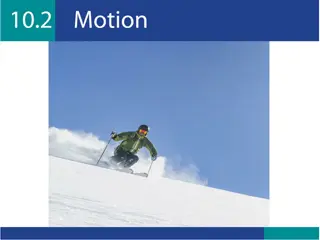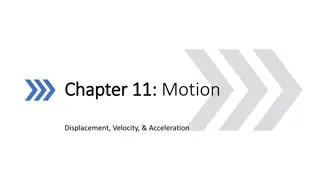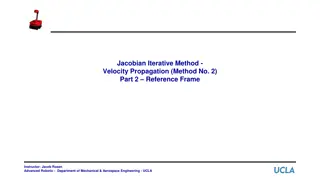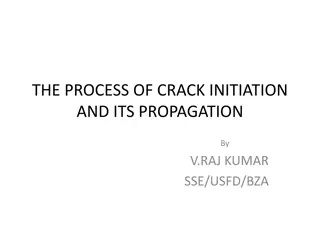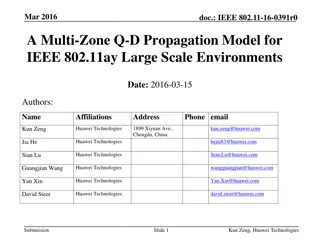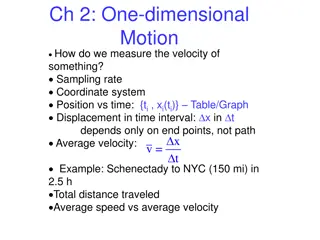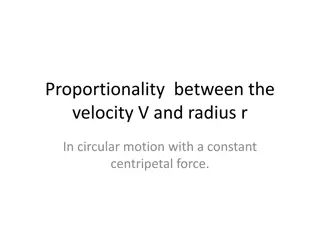Understanding Slider Crank Mechanism: Practice Problems and Solutions
Explore a practice problem based on a slider crank mechanism, involving calculations for velocity of the slider, velocity of a point on the connecting rod, and angular velocity. Detailed steps and solutions provided to understand the concepts clearly.
1 views • 6 slides
Understanding Acceleration in Physics
Acceleration is the rate at which velocity changes, encompassing both increases and decreases in speed. In physics, acceleration is defined as the rate of change in velocity, making it a vector quantity due to its directional nature. This article explores the concept of acceleration, including examp
0 views • 15 slides
Understanding Velocity vs. Speed in Physics
Velocity and speed are fundamental concepts in physics that describe how fast an object is moving and in what direction. While speed is a scalar quantity representing the rate of motion, velocity is a vector quantity that includes both speed and direction. Constant velocity implies steady speed and
0 views • 8 slides
Understanding Rotational Motion: Angular Velocity and Acceleration
Explore the concepts of angular velocity, radians, and rotational motion in this educational content. Learn about the relationship between angular and linear velocity, angular acceleration, tangential acceleration, and centripetal acceleration through practical examples. Enhance your understanding o
4 views • 17 slides
Flow Measurement Using V-Notch and Weirs in Engineering
Flow measurement in engineering involves the use of V-notch and weirs, such as rectangular weirs and triangular weirs, to calculate discharge rates and velocity of liquids. A V-notch is a triangular obstruction used for flow measurement, while weirs are larger scale structures for measuring river or
1 views • 7 slides
Determining Ultrasonic Wave Velocity in Liquid Using Interferometer
An ultrasonic interferometer apparatus is used to determine the velocity of ultrasonic waves in a liquid medium by creating longitudinal stationary waves and utilizing the principles of diffraction. The experiment involves passing monochromatic light through the liquid, creating an acoustic grating,
0 views • 16 slides
Understanding the Relationship Between Position, Velocity, and Acceleration Graphs
Gain intuition on how position, velocity, and acceleration are visually related through s-t, v-t, and a-t graphs. Discover how to interpret and draw accurate velocity vs. time plots based on position vs. time data. Learn the significance of comparing these charts and how they can be useful in variou
0 views • 20 slides
Understanding Velocity: The Key to Motion
Velocity is the speed and direction at which an object moves, indicating both its position and rapidity. It is crucial for measuring the rate of change of an object's position over time and differentiates from speed as a vector quantity. This comprehensive guide delves into the concepts of velocity,
2 views • 33 slides
Understanding Radio Wave Propagation in the Ionosphere
Radio wave propagation in the ionosphere is influenced by factors such as the radio refractive index and absorption of radio wave energy. This chapter delves into the interaction of radio waves with the ionosphere, discussing concepts like the electromagnetic spectrum nomenclature and the frequency
0 views • 15 slides
Understanding Relative Velocity and Acceleration in Physics
Relative velocity is defined as the velocity of an object in the rest frame of another object, and it can be negative depending on the difference in velocities. The need for using relative velocity lies in determining if an object is at rest or moving. The formula for relative velocity involves the
1 views • 25 slides
Understanding Vectors and Velocity in Physics and Game Programming
Exploring the concepts of vectors, velocity, and positional vectors in both physics and game programming. Learn about key properties, conversion formulas, and the application of velocity vectors to positional vectors using examples and visual representations.
1 views • 32 slides
Plant Propagation Techniques and Tree Planting Guide
Learn various plant propagation methods such as division, bulbs and corms, tubers and rhizomes, along with essential tips for planting and care. Understand the processes of asexual propagation and division with detailed steps for successful plant propagation and growth. Discover how to propagate pla
0 views • 7 slides
Physics Concepts: Angular Velocity, Radians, and Acceleration Explained
Understand essential physics concepts such as angular velocity in radians, comparison of angular velocities, tangential velocity, magnitudes of velocities, and angular acceleration as applied to various scenarios like rotating wheels, clock hands, and spinning objects. Dive into the relationships be
1 views • 31 slides
Understanding HF Propagation and Solar Activity
Explore the basics of HF propagation, how solar activity influences band conditions, and the impact of phenomena like sunspots, flares, and CMEs. Learn which bands to use for effective communication and grasp the fundamentals of wave propagation, refraction, and reflection. This presentation provide
0 views • 30 slides
Understanding Weak Signal Propagation in Radio Waves
This informative content delves into weak signal propagation and its various aspects related to electromagnetic waves, particularly in the context of radio communication. It covers topics such as radio waves, radio horizon, knife-edge diffraction, tropospheric scatter mode, auroral reflection, and m
1 views • 37 slides
Understanding HF Propagation for Amateur Radio Communication
Dive into the world of HF propagation and how signals travel from one point to another in amateur radio communication. Explore topics such as ionosphere basics, critical frequency, practical examples, and the importance of the F2 layer. Gain insights into launching waves, propagation prediction meth
0 views • 34 slides
Understanding Relative Velocity of Bodies in Motion
The content explains concepts related to relative velocity of moving bodies, including diagrams illustrating velocity relationships, application of laws of parallelogram and triangle, analysis of motion in rigid links, and calculation of rubbing velocity at pin joints in mechanisms. It covers scenar
0 views • 23 slides
Graphical Method for Velocity Analysis of Planar Mechanisms
Learn about the graphical method for velocity analysis of planar mechanisms through practice problems involving slider-crank mechanisms and link velocities. Understand how to calculate slider velocity, point velocity, and angular velocities using the given dimensions and rotational speeds. Visualize
0 views • 6 slides
Measurement of Flow Velocity on Frozen and Non-Frozen Slopes of Black Soil Using Leading Edge Method
This study presented a detailed methodology for measuring flow velocity on frozen and non-frozen slopes of black soil, focusing on the Leading Edge method. The significance of shallow water flow velocity in soil erosion processes was emphasized. Various methods for measuring flow velocity were compa
0 views • 23 slides
Strategies for Generating Velocity Solutions with GLOBK
Basics of velocity solutions, setup strategies, and data cleaning methods for optimizing GLOBK solutions to generate position, velocity, offset, and postseismic parameter estimates. The aim is to combine years of data, make critical decisions on data treatment, and ensure accuracy in the process noi
0 views • 22 slides
Understanding Wireless Propagation Models: Challenges and Applications
Wireless propagation models play a crucial role in characterizing the wireless channel and understanding how signals are affected by environmental conditions. This article explores the different propagation mechanisms like reflection, diffraction, and scattering, along with the challenges and applic
1 views • 14 slides
Understanding Vegetative Propagation in Flowering Plants
This content explores the concept of vegetative propagation in flowering plants, focusing on asexual reproduction, flower structure, and gamete formation. It covers topics such as types of vegetative propagation, reproductive mechanisms, and the advantages of this process. Readers can test their kno
0 views • 50 slides
Understanding Internal Flow in Heat Transfer Processes
Exploring internal flow characteristics in heat transfer, we delve into topics like laminar flow, velocity profiles, Reynolds number, and entry lengths for different flow regimes. Images illustrate concepts such as fully developed velocity profiles and the impact of flow conditions on the mean veloc
0 views • 27 slides
Understanding Acceleration in Physics
Explore the concept of acceleration through real-world scenarios involving moving objects and graphs. Learn how to determine the direction of acceleration based on the velocity changes of cars, divers, bungee jumpers, and more. Delve into examples of calculating average acceleration and final veloci
0 views • 11 slides
Laser Beam Propagation in Maritime Environment Study
Investigation and comparison of laser beam propagation in maritime environments through field and laboratory experiments. The study examines the effects of real-life conditions such as temperature fluctuations, wind, and aerosols on laser light propagation. A basic field experiment at the US Naval A
0 views • 11 slides
Understanding Micropropagation: A Clonal Propagation Method
Micropropagation is a popular method for vegetative propagation in plants, providing genetically identical copies through aseptic tissue culture techniques. This technique allows for mass production of true-to-type plantlets in a short time, crucial for the commercial propagation of horticultural cr
0 views • 42 slides
Understanding Motion: Speed, Velocity, and Acceleration
Motion is the change in position of an object relative to a reference point. Speed is the distance traveled divided by the time interval, while velocity includes direction. Acceleration refers to the rate of change of velocity. Different concepts and scenarios related to motion, speed, velocity, and
0 views • 16 slides
Graphical Models and Belief Propagation in Computer Vision
Identical local evidence can lead to different interpretations in computer vision, highlighting the importance of propagating information effectively. Probabilistic graphical models serve as a powerful tool for this purpose, enabling the propagation of local information within an image. This lecture
0 views • 50 slides
Understanding Speed and Velocity in Physics
Speed and velocity are fundamental concepts in physics. Speed is a scalar quantity that can be average or instantaneous, while velocity is a vector quantity that includes direction. Equations such as v=d/t help calculate these values. Average speed and average velocity are important in determining t
1 views • 10 slides
Understanding Radio Wave Propagation and Operating Procedures in Subelement E3
Explore the fascinating world of radio wave propagation, including topics such as Earth communications, meteor scatter, microwave propagation, aurora propagation, and various techniques like trans-equatorial propagation. Learn about the maximum separation between stations communicating by Moon bounc
1 views • 101 slides
Understanding Kinematics Graphs in Physics
Explore the concepts of kinematics graphs through diagrams and descriptions. Learn to interpret distance-time, velocity-time, and speed-time graphs. Understand key parameters such as displacement, initial velocity, final velocity, constant acceleration, and time spent on different parts of a journey
0 views • 33 slides
Understanding Motion in Physics
Explore the concepts of speed, velocity, and acceleration in physics, learn how to interpret distance-time and velocity-time graphs, and practice calculating the speed and acceleration of objects. Engage in experiments to calculate average speeds and write reports detailing procedures, variables, da
0 views • 77 slides
Understanding Motion: Displacement, Velocity, and Acceleration
Explore the fundamental concepts of motion, including displacement, velocity, and acceleration. Learn about reference points, distance versus displacement, speed versus velocity, and how to calculate average speed and acceleration. Dive into examples illustrating these concepts in real-world scenari
0 views • 24 slides
Understanding Jacobian Iterative Method for Velocity Propagation
Explore the Jacobian Matrix and its applications in velocity propagation for robotics. Learn about recursive expressions, differentiation methods, and handling linear and angular velocities in different frames of reference. Delve into the dynamics of a 3R robot example and grasp the concept of Jacob
0 views • 26 slides
Analyzing Firing Velocity of N-Strike Elite Nerf Gun by Haley Vermette
Haley Vermette conducted a project to test the claim made by Hasbro about the N-Strike Elite Nerf Gun's shooting range. Through critical thinking, problem-solving, and testing, various variables like time, distance, muzzle height, and firing velocity were analyzed to support or disprove the claim on
0 views • 15 slides
Understanding the Process of Crack Initiation and Propagation
The process of crack initiation and propagation in materials is essential to comprehend for assessing fracture risk. This involves calculating defect sizes using fracture toughness values and understanding how cracks develop under repeated stresses, leading to fast fractures. The direction of crack
0 views • 36 slides
Motion and Velocity Concepts Illustrated Quiz Review
Explore concepts of distance, speed, displacement, and velocity through examples of a moving truck's position, Julie's journey to meet her friends, and calculations of velocity for trips from Pittsburgh to Philadelphia and Hong Kong to Los Angeles. Understand the differences between speed and veloci
0 views • 8 slides
Multi-Zone Propagation Model for IEEE 802.11ay Large Scale Environments
The presentation by Huawei Technologies introduces a multi-zone propagation model for IEEE 802.11ay in large-scale scenarios operating in the 60 GHz band. It aims to address the diverse physical effects experienced by signals over long distances, complementing the existing Q-D channel model for more
0 views • 12 slides
Understanding One-Dimensional Motion and Velocity Measurements
Exploring the concept of velocity measurement in one-dimensional motion, this content delves into the sampling rate, coordinate systems, and the relationship between position and time. It discusses average velocity, instantaneous velocity, and the significance of slope on graphs representing motion.
0 views • 22 slides
Understanding Orbital Motion and Circular Velocity in Physics
Explore the concept of orbital motion and circular velocity in physics, where we delve into the relationship between velocity and radius in circular motion with a constant centripetal force. Through Newton's 2nd Law and gravitational forces, we uncover the dependence of satellite speed on the radius
0 views • 13 slides
